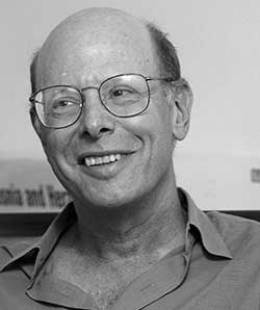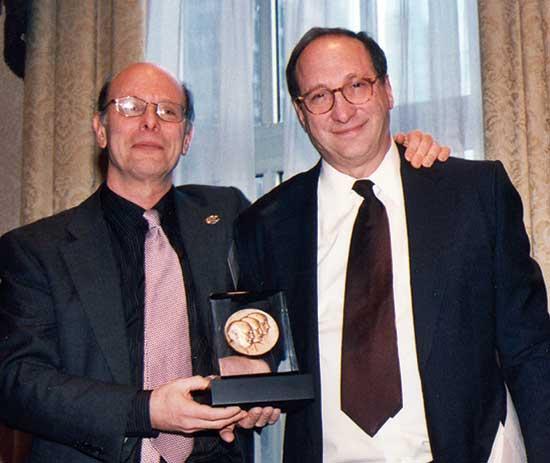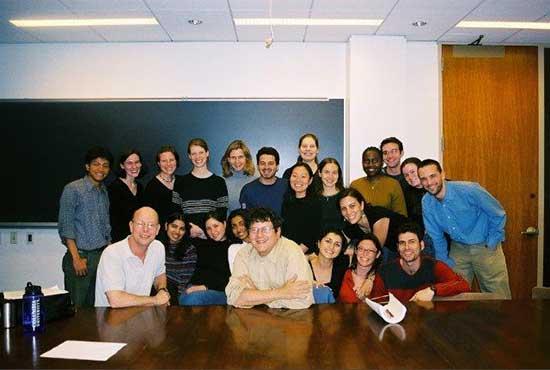Tribute: The Columbia Law School Community Remembers Michael Ratner '69
Ratner Leaves a Long Legacy as a Visionary Lawyer and Fierce Advocate of International Human Rights
New York, May 12, 2016—Prominent civil liberties attorney Michael Ratner ’69, a distinguished Columbia Law School graduate and passionate crusader for social justice who stood at the forefront of some of the most high-profile cases of the post-9/11 era, passed away on Wednesday, May 11, 2016, at the age of 72.
According to The New York Times, Ratner may be best remembered for successfully challenging the U.S. government's detention of prisoners at Guantanamo without judicial review. More recently, he went on to defend Wikileaks founder Julian Assange after the release of millions of confidential government documents. Throughout his career, Ratner championed prisoners’ rights, fought for the protection of whistleblowers, and advocated for the end of human rights abuses around the world.
Born in Cleveland in 1943, Ratner grew up in a post-World War II nation on the brink of significant social change. After graduating from Brandeis University in 1966, he entered Columbia Law School at a time when college campuses—including Columbia’s—were a hotbed of student protest against the Vietnam War.
The activism displayed on Columbia University’s Morningside Heights campus during that time had a profound impact on Ratner, who championed civil rights as a law student. During his time at the Law School, he worked at the NAACP Legal Defense and Educational Fund (LDF) on school segregation issues in Baltimore. Ratner also became involved with the National Lawyers Guild (NLG) during this time, and worked to revive its student chapter. He later served as NLG’s president.
After graduation, Ratner clerked for former LDF attorney Constance Baker Motley ’46, then a U.S. District Court judge for the Southern District of New York. In 1971, he joined the Center for Constitutional Rights (CCR) as a staff attorney. Ratner would spend more than 40 years working for or in partnership with the organization, serving as CCR’s legal director from 1984 to 1990, and as its president from 2002 to 2014.
In 2005, Columbia Law School bestowed upon Ratner its highest honor, the Medal for Excellence, for his achievements over the course of his distinguished career. (His brother, Bruce, who graduated from the Law School in 1970, accompanied Ratner to the ceremony and proudly presented him with his award.) Ratner also served as an instructor at the Law School from 1999 to 2003, teaching International Human Rights Litigation in National Courts. He was the Public Interest Law Foundation’s achievement award recipient for the 1998–1999 academic year.
Ratner is survived by his wife, Karen Ranucci; his children, Jake and Ana; his brother, Bruce; and his sister, Ellen Ratner.
| Ratner (left), pictured here with his brother Bruce Ratner '70, received the Law School's Medal for Excellence in 2005. |
*This piece will be updated as tributes are received.
Tributes to Michael Ratner ’69
Upon learning of his passing, a number of faculty members and alumni who worked with Ratner throughout the years were eager to share their stories and remembrances of him, which are compiled below. He will be greatly missed by all of his colleagues and friends at Columbia Law School.
Sarah H. Cleveland, Louis Henkin Professor of Human and Constitutional Rights; Faculty Co-director of the Human Rights Institute
“I had the privilege of working closely with Michael Ratner as a third-year law student, when I was part of a team of Yale Law School students and attorneys who brought a major lawsuit against the U.S. government on behalf of Haitian refugees being interdicted on the high seas and HIV+ Haitian refugees being detained on Guantanamo. The case was litigated before Judge Sterling Johnson in the Eastern District of New York, went to the U.S. Supreme Court, and we ultimately succeeded in closing the world’s first HIV detention camp and securing the release of the refugees to their families in the United States.
Michael made me a human rights lawyer. He was a truly inspiring, brilliant, fearless, and tenacious human rights lawyer and activist. No challenge was too formidable. Throughout his life—including in the Haitian litigation and in his defense two decades later of the habeas rights of Guantanamo detainees—he took on the fights that others thought were impossible, always in relentless defense of principle. He had a David-and-Goliath attitude toward speaking truth to power, and defending the powerless. Often—surprisingly—he won. But win or lose, our world is a better place because of him and his determined commitment to justice.
I teach the Haitian Refugee litigation in my CLS Civil Procedure course through a book about the case called Storming the Court. As a result, hundreds of Columbia Law students in recent years have also had the opportunity to learn from Michael and be inspired by his example.”
Katharine Franke, Isidor and Seville Sulzbacher Professor of Law; Director of the Center for Gender and Sexuality Law; Chair of the Center for Constitutional Rights Board of Trustees
“Michael Ratner was among the most visionary lawyers of our generation, holding the U.S. government accountable when it went to war illegally, tortured its citizens, withheld state secrets, limited the rights of a free press, persecuted political dissidents and in countless other contexts. There has hardly been a progressive social movement in the last 35 years that Michael hasn’t been part of, contributing his phenomenally creative and cutting-edge legal mind. All of us who treasure freedom and oppose oppressive state violence owe a debt of gratitude to Michael Ratner. He leaves a legacy of fearless, smart, political lawyers and advocates who aim to follow in Michael’s footsteps.”
Sarah Knuckey, Lieff Cabraser Associate Clinical Professor of Law; Faculty Co-Director of the Human Rights Institute; and Director of the Human Rights Clinic
“Michael's courageousness, generosity, love, and strategic vision inspired and guided generations of human rights advocates around the world. Since his days as a law student, he defined what it means to commit your legal education to its most important purpose: fighting for social justice and supporting others to do the same.”
Ellen P. Chapnick, Dean for Social Justice Initiatives
“Michael Ratner exemplifies what it means to be a “peoples’ lawyer” for several generations of Columbia Law graduates. The lucky ones worked with him at CCR as interns and new lawyers or as co-counsel on campaigns and cases. Others read about his innovative and fearless uses of the law, his focus on the humans in “human rights” and his refusal to do what was fashionable if important work had to be done. They all are an important part of his legacy.”
Penelope Andrews '84 LL.M., Dean of the University of Cape Town
“I remember Michael as a fierce human rights campaigner, particularly around the issue of apartheid and racism. I came to Columbia Law School as a graduate student in 1983 at the height of the anti-apartheid struggle, when Nelson Mandela was still in jail and democracy in South Africa was but a dream. Michael Ratner and the team at the Center for Constitutional Rights (including the late Haywood Burns, former dean of CUNY Law) hosted several events for anti-apartheid lawyers, and served as sources of inspiration and strategy for many lawyers and activists from South Africa who passed through New York. I know that he and other lawyers at the CCR influenced anti-apartheid lawyers and activists on some of the litigation and other anti-apartheid strategies that they pursued before the courts in South Africa in the dying days of apartheid.Michael combined a fierce passion for justice with a deep humanity.”
Gabor Rona '06 LL.M., Lecturer in Law
"Lou Henkin taught me human rights, but Michael Ratner taught me not only how to DO human rights, but also that you can maintain your faith in humanity even while seeped in the worst that human beings can do to each other."
Richard Weisberg '74, Walter Floersheimer Professor of Constitutional Law at Cardozo Law School
"Our friendship began at Brandeis in the early '60s. In those formative years, I recall vividly his interest in literature, and his warmth and self-deprecating sense of humor, all traits of Michael's that lasted his whole life. The atmosphere at Brandeis in those days spurred the activism that soon made him so important to me and to so many others. I have never forgotten his kindness and wisdom in counseling me in the mid-90s, when a small team of plaintiffs' lawyers began the quest in U.S. federal court for a measure of justice towards victims of the Holocaust in Europe. The odds were long, but Michael was used to that. Neither at Brandeis nor at Columbia Law School nor anywhere else did Michael learn the meaning of the tiresome word 'quixotic.' But in him also was a quiet self-awareness, in part perhaps gleaned from his readings of Camus, another of the great ones who died too young. Some fights cannot be won. What counts, as Michael continues to teach us, is the meaningfulness of the battle."
William Verick '88, Klamath Environmental Law Center
"Michael gave me an important lesson on how to do Human Rights litigation on the fly.
In the early 90’s, Michael and I were working on a case together seeking to repatriate pre-Columbian Bolivian textiles to the Aymara people who had communally owned them. The Aymara worshiped the textiles because they believed they embodied the souls of their ancestors. An art dealer had bribed custodians of the textiles and had brought them to San Francisco, where the Customs Service impounded them. I was California counsel.
At the time I was living in Oakland, and then WBAI news director Amy Goodman was staying with me while she was in the Bay Area covering the International AIDS conference.
Michael called to discuss the case and I mentioned to Amy that Michael was on the phone. Amy said to tell Michael that Guatemalan General Hector Gramajo was going to receive a graduate degree from Harvard in a couple of days. Gramajo was one of the generals who had helped perpetrate the Reagan-era genocide of the Mayan people in the Guatemala highlands. I put Michael and Amy on the phone together.
The upshot was that within a week, Amy’s brother showed up at Gramajo’s graduation ceremony and served Gramajo—dressed in cap and gown—with a lawsuit the Center for Constitutional Rights had filed against him. A picture of the event wound up on the front page of The New York Times."
Reed Brody, '77, Lecturer in Law; Counsel and Spokesperson at Human Rights Watch
"Michael was my mentor, my role model, my co-author, my co-counsel, and, for four years, my Columbia Law School co-professor as we shared with a new generation of law students our ideas for how to 'bring the bad guys to justice.' But more than the material that we taught, I know that what the students loved the best was being in the presence of Michael, and seeing how a man who challenged authority in the most uncompromising way was also a kind and generous human being who took an interest in each of the students, their ideas, and their lives. A great many have followed Michael into careers working for social justice."
| Ratner (bottom row, left) co-taught a Columbia Law School course with Reed Brody (center) from 1999–2003. |


